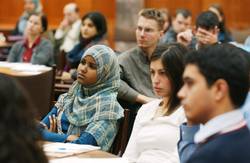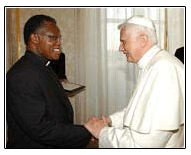[스크랩] 바티칸과 WCC 홈페이지에서 본 종교 통합 실천 움직임
1. WCC의 움직임
The WCC is a fellowship of churches, now 349 in more than 110 countries in all continents from virtually all Christian traditions WCC e-news HomeSite mapWho are we? | Programmes | News | Resources | Member churches WCC > Programmes > Inter-religious dialogue and cooperation WCC Programmes Index The WCC and the ecumenical movement in the 21st century Unity, mission, evangelism and spirituality Public witness: addressing power, affirming peace Justice, diakonia and responsibility for creation Education and ecumenical formation Inter-religious dialogue and cooperation Inter-religious trust and respect Christian self-understanding Churches in situations of conflict Communication Inter-religious dialogue and cooperation
Participants in a WCC youth interfaith forum, Geneva, November 2005.At the dawn of the 21st century, religion plays a central role in public life, and has become a significant identity marker. ( 2005년 11월 WCC의 종교간 포럼에 참석한 사람들. 21세기 벽두에 종교는 공공 생활의 중심이 될 것이며 중요한 정체성 식별마크가 될 것이다.) In our increasingly pluralistic societies, more inter-religious dialogue and cooperation are needed if conflict fueled by religion is to be constructively addressed. ( 점증하는 다원주의 경향의사회 속에서는 종교간 대화와 협력이 더욱더 중요하다. 그래서 종교가 일으킨 갈등을 건설적으로 해결하여야 할 것이다.) Spiritual and religious traditions are a source of values that can defend dignified life for all; these traditions need to be explored. (영적 종교적 전통은 모든 사람에게 고귀한 인생을 제공할 수 있는 가치의 원천이다 : 이러한 전통은 발굴될 필요가 있다.) We need new ways to understand both particularity, universality and plurality; we must learn to live our faith with integrity while respecting and accepting each other. ( 우리는 각 종교의 특수성, 보편성, 다원성을 이해할 새로운 방법을 필요로 한다. 우리는 서로를 인정하고 존중하며 합일된 자세로 우리의 믿음 생활하는 것을 배워야 한다.) Projects Inter-religious trust and respect This project attempts to strengthen inter-religious trust and respect through bilateral and multilateral dialogues, regional and cross-cultural encounters on topics like religion and violence, perceptions of "the other", and the search for identity in pluralistic societies. ( 종교간 신의와 존경심 이 프로젝트는 각종교간의 상호간 다자간 대화를 통하여 종교간의 신의와 존경심을 함양하도록 기획된다. 그리고 다원주의적 사회에서의 정체성에 대한 연구과 다른 것에 대한 이해와 종교와 폭력에 대한 다문화간의 만남을 추진한다.) Christian self-understanding This project engages member and non-member churches and Christian communities in reflection on what it means to be a Christian in a world of many religions, and on conversion as an issue in inter-religious relations. ( 기독인의 자기 이해 이 프로젝트는 멤버 교회와 비 멤버 교회 그리고 기독단체들 간에 다종교의 세계속에서 기독인이 된다는 것이 무엇인가를 성찰하고 종교간 관계속에서 개종의 의미를 반추하게 한다.) Churches in situations of conflict This project accompanies and equips churches for advocacy in countries where religion is being used to fuel conflict.
발췌 ttp://www.oikoumene.org/?id=2940
2. 바티칸의 움직임
THE PONTIFICAL COUNCIL FOR INTERRELIGIOUS DIALOGUE ( 종교간 대화 주교 협의체)
On Pentecost Sunday, 1964, Pope Paul VI instituted a special department of the Roman Curia for relatons with the people of other religions. Know at first as the Secretariat for Non Christians, in 1988 it was renamed the Pontifical Council for Interreligious Dialogue (PCID). ( 1964년 오순절에 교황 바울 6세는 다른 종교의 사람들과의 관계를 위하여 특별한 부서를 만들었다. 처음에는 비기독교인을 위한 기관을 불려지다가 1988년 PCID : 종교간 대화 주교 협의체라고 명명하게 된다.) A) Nature and Goals of PCID ( PCID의 본질과 목적) The PCID is the central office of the Catholic Church for the promotion of interreligious dialogue in accordance with the spirit of the Second Vatican Council, in particular the declaration "Nostra Aetate". It has the following responsabilities: (..... 다음과 같은 일을 맡는다.) 1) to promote mutual understanding, respect and collaboration between Catholics and the followers of others religious traditions; ( 1) 카톨릭과 다른 종교간의 이해, 존경심, 협조를 증진 시킨다. ) 2) to encourage the study of religions; ( 2) 종교의 연구를 활성화한다.) 3) to promote the formation of persons dedicated to dialogue. ( 3) 대화에 참여할 사람들을 구성한다. ) N.B. It should be noted that the PCID does not have responsability for Christian-Jewish relations. These are the competence of the Commission for religious Relations with Jews, which comes under the Pontifical Council for Promoting Christian Unity. ( 주 PCID는 크리스쳔-유대교간의 관계의 임무를 맡지 않는다. 이 임무는 유대교 관계 위원회의 업무와 경합 되기 때문이다. 이 업무는 크리스쳔 일치 증진 주교 협의체에서 담당할 것이다.) B) Methodology of PCID 1) Dialogue is a two-way communication. It implies speaking and listening, giving and receiving, for mutual growth and enrichment. It includes witness to one's own faith as well as an openess to that of the other. It is not a betrayal of mission of the Church, nor is it a new method of conversion to Christianity. This has been clearly stated in the encyclical letter of Pope John Paul II "Redemptoris Missio". This view is also developed in the two documents produced by the PCID: The Attitude of the Catholic Church towards the Followers of Other Religious Traditions: reflections on Dialogue and Mission (1984), e Dialogue and Proclamation (1991). 2) Although the PCID is the central office for dialogue in the Catholic Church, dialogue is mainly carried out in and through the Local Churches. Many Local Churches have dialogue commissions, at the national or regional level. The PCID works in close collaboration with these, and encourages their formation where they do not yet exist. 3) The ecumenical dimension of interreligious dialogue is kept in mind. The PCID has an ongoing relationship with the corresponding office in the World Council of Churches. ( 종교간 대화의 에큐메니칼 운동을 염두에 둔다. PCID는 W C C의 사무소와 계속적인 연락 관계를 갖는다.) 4) The PCID restricts itself to religious questions. Its brief does not extend to socio-political issues. The Roman Curia has various departments, each with its own specific competence. Broader issues are discussed in inter-departmental meetings. C) Structure of the PCID 1) Decision-making body: this is composed of the Members of the Council, about 30 in number, Cardinals and Bishops, from different parts of the world. Every two or three years a Plenary Assembly is held in order to discuss important issues and to set guidelines for the work of the Council. 2) Advisory body: the PCID has about 50 advisors, called Consultors, specialists in religious studies or in the practice of interreligious dialogue, residing in all continents. They assist the PCID through their research, information and suggestions. Periodically meetings of Consultors are held, often on a continental level. 3) Executive body: the permanent staff in Rome, made up of President, Secretary, Under-Secretary, bureau chief for Islam, staff members for Africa and Asia, a staff member for New Religious ovements, an administrative assistant and support staff. D) Activities 1) Welcoming Visitors. The PCID receives many visits from religious leaders. They are invited to dialogue with staff members. Where appropriate Audiences are arranged with H.H. the Pope. There are also meetings with bishops coming to Rome for their five-yearly "ad limina" visits, and with other groups of visitors. 2) Visits. The President and the Secretary visit local Churches to become more familiar with the local situation and to encourage dialogue. On these occasions they visit leaders of other religions and different institutions in order to promote better understanding and collaboration. 3) Meetings. The Council organizes dialogue meetings, or more often participates in such meetings organized by oher bodies, at regional, national or international levels. These meetings may be bilateral or multilateral. 4) Publications. A number of books and pamphlets have been published on different aspects of interreligious dialogue. The Council usually publishes the Acts of the dialogue meetings it organizes. A bulletin, called "Pro Dialogo", is published regularly three times a year, containing significant Church texts on dialogue, articles, and news of dialogue activities throughout the world. An Interreligious Dialogue Directory has also been published. E) Commission for religious relations with Muslims ( 이슬람과의 종교관계 위원회) The PCID has a special commission for relations with Muslims. This is composed of a President, Vice-President and Secretary, and has a small group of eight Consultors. It engages in studies on different aspects of Christian-Muslim relations. F) Foundation "Nostra Aetate"
The PCID has set up a Foundation whose purpose is to promote dialogue, mainly by according grants to people of other religious who wish to study Christianity.
|



